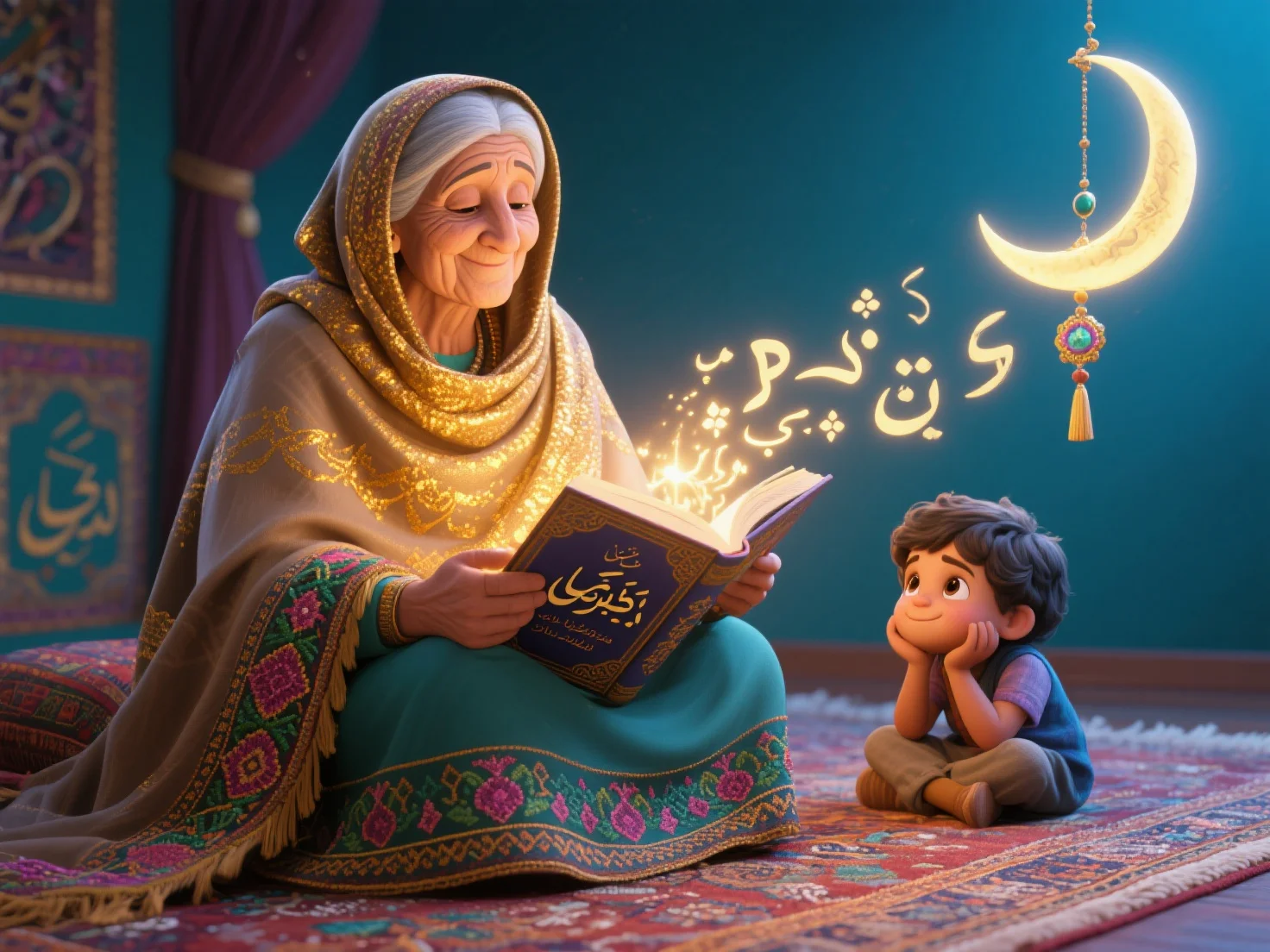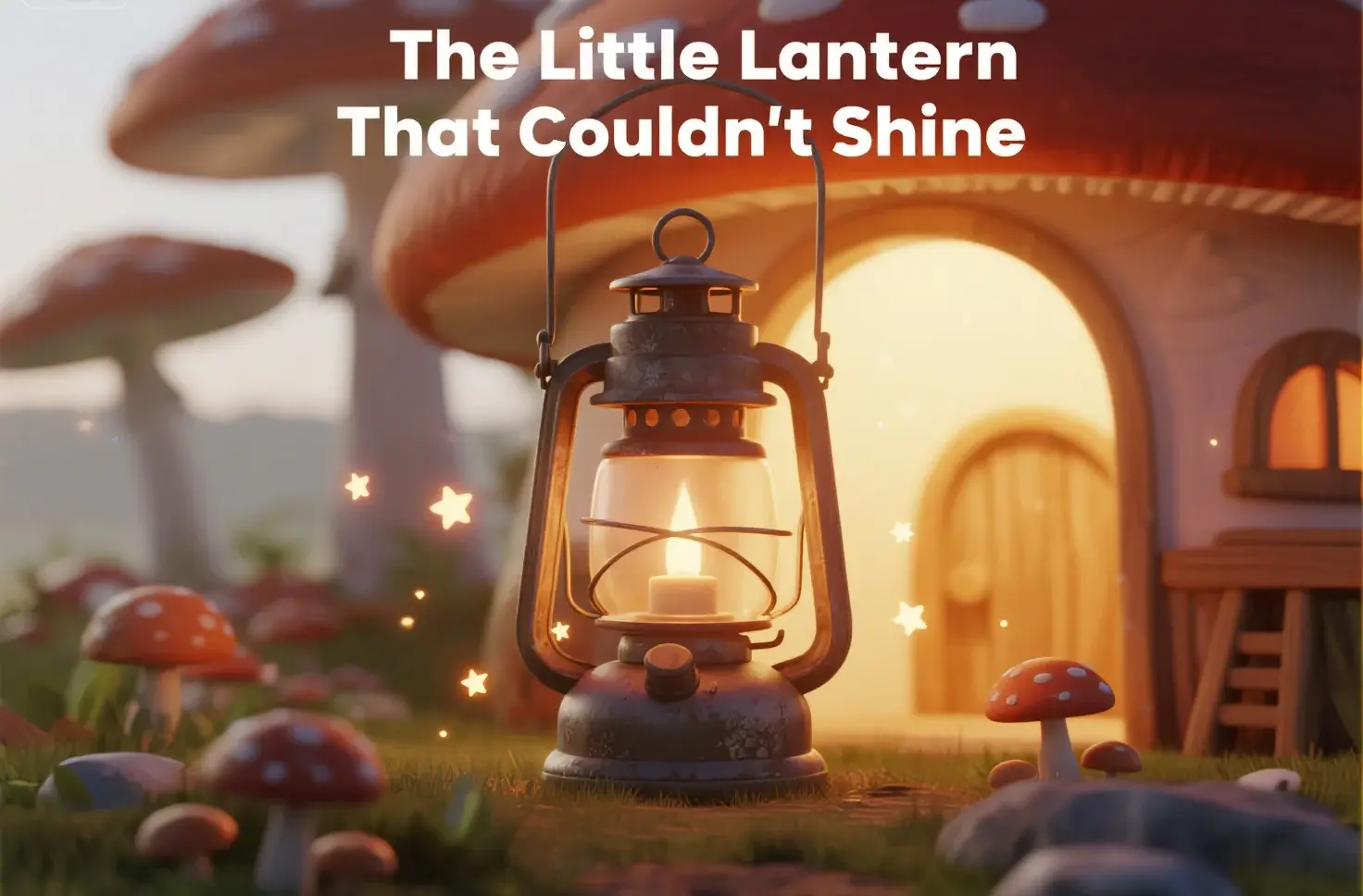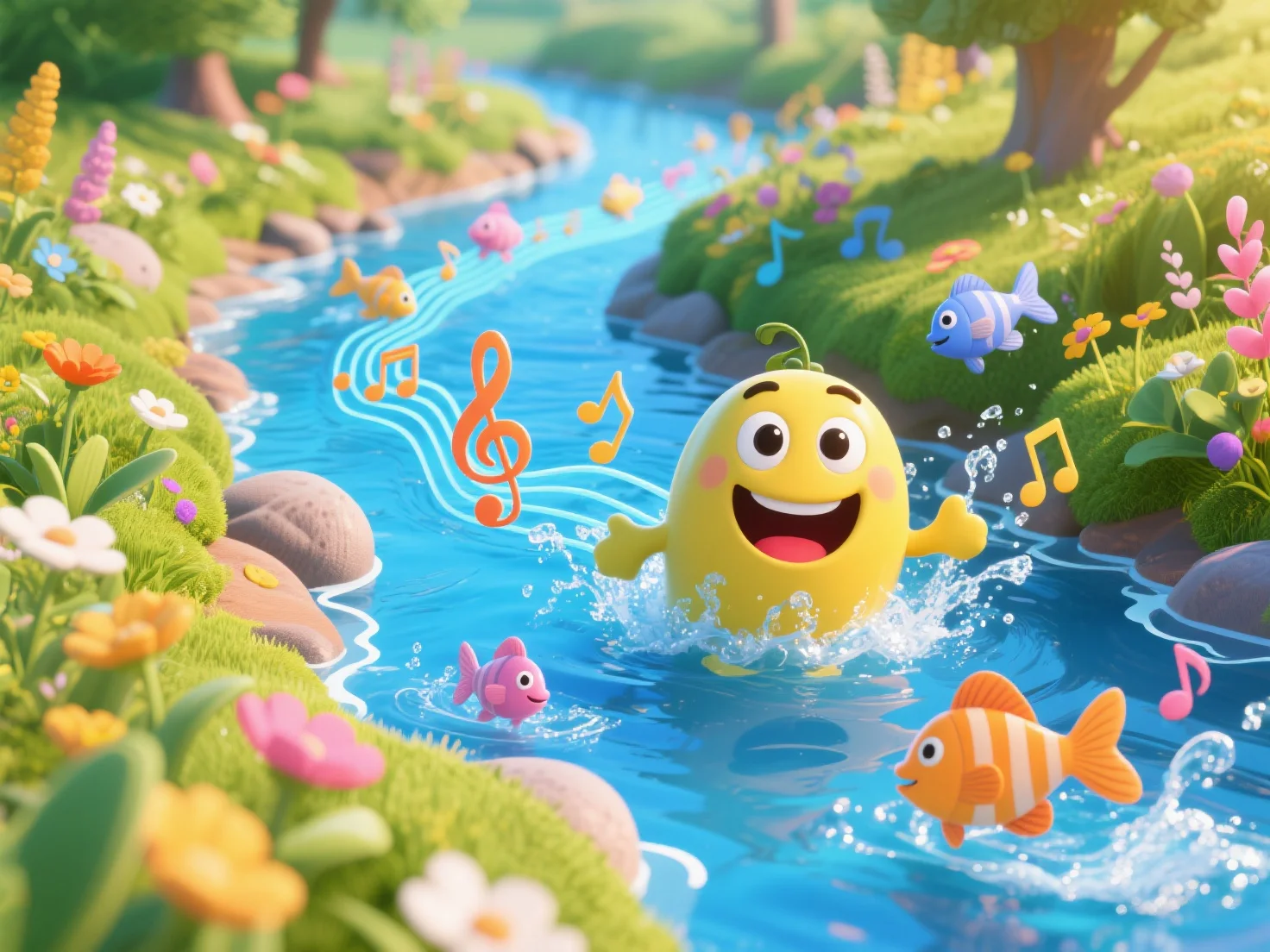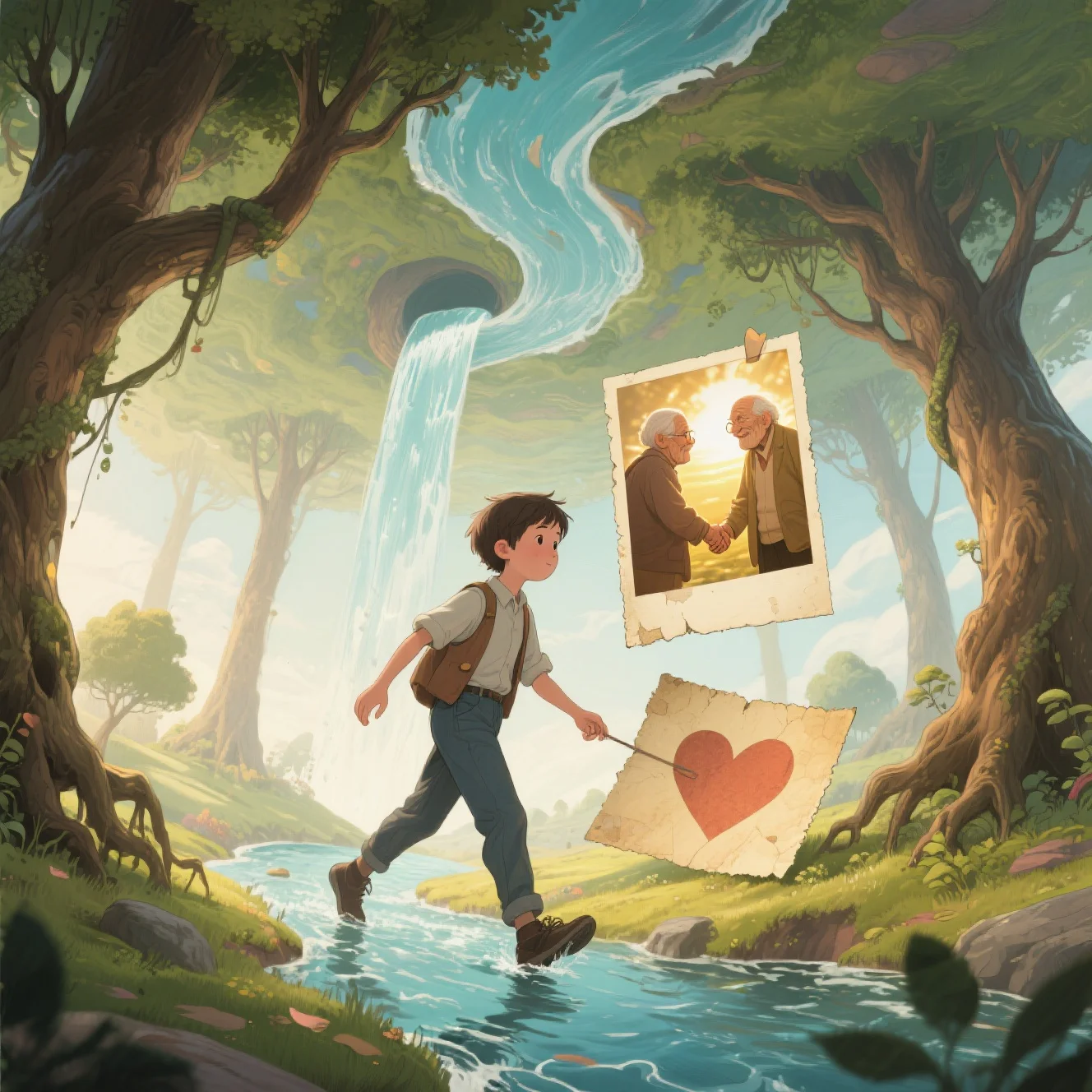The Magical Stories of Grandmother
A heartwarming tale about a grandmother who shares beautiful stories with her grandchildren, teaching them about heritage, wisdom, and the magic of storytelling.

The Magical Stories of Grandmother
In a cozy house filled with the sweet aroma of cardamom tea and jasmine flowers, lived Grandmother with her three beloved grandchildren: Zara, Ahmed, and little Fatima. Every evening, as the golden sun painted the sky in shades of orange and pink, something magical would happen—Grandmother would gather her grandchildren around her comfortable cushions and share the most wonderful stories.
Chapter 1: The Treasure Chest of Stories
Grandmother had a special wooden chest, carved with beautiful patterns of roses and peacocks. Inside this chest, she kept her most precious treasures—not gold or jewels, but hundreds of stories that had been passed down through generations.
"Grandma," asked curious Zara one evening, "why do you always tell us these old stories Why not stories in English like the ones at school"
Grandmother's eyes twinkled like stars as she opened her treasure chest. "My child, these stories are like magical seeds. They carry the wisdom of our ancestors, the beauty of our culture, and the love of our family. When I tell you these stories, I'm giving you a piece of your heritage."
Little Fatima clapped her hands excitedly. "Tell us a story, Grandma! Tell us one of your special stories!"
Chapter 2: The Story of the Generous Sparrow
Grandmother smiled and began one of her favorite stories:
"Once upon a time, in a village surrounded by wheat fields, there lived a little sparrow named Chidiya. This sparrow was known throughout the village for her kind heart..."
As Grandmother told the story, Ahmed noticed something magical. The words seemed to dance in the air, painting pictures in his mind of golden fields, generous sparrows, and wise old trees.
"The sparrow shared her grain with hungry ants during winter," Grandmother continued, "and when spring came, the grateful ants helped her build the most beautiful nest in the entire village."
"What does this story teach us, Grandma" asked Ahmed thoughtfully.
"It teaches us that kindness always comes back to us, my child. The good you do will always find its way back to you."
Chapter 3: The Night of Many Stories
One special evening, when the monsoon rains drummed gently on the roof, Grandmother decided to have a "Night of Many Stories." She invited the children's cousins and friends to join them.
"Tonight," she announced, "I will tell you stories from different parts of our beautiful culture. Stories from the mountains, stories from the valleys, stories from the cities—each one a jewel in our crown of heritage."
The children gathered around, their eyes wide with anticipation. Grandmother began with a tale about a brave princess from the mountains, then moved to a funny story about a clever jackal, and finally told them a beautiful love story about the moon and the stars.
"Each of these stories," she explained, "comes from a different region, but they all share the same values—courage, wisdom, love, and respect for others."
Chapter 4: The Children Become Storytellers
As weeks passed, something wonderful happened. The children began remembering the stories and started telling them to each other during playtime.
Zara would act out the brave princess story, using a shawl as a cape and a wooden spoon as a sword. Ahmed would gather the younger children and tell them about the clever jackal, making funny voices and gestures. Even little Fatima learned to recite short poems and riddles.
"Look, Grandma!" Fatima said proudly one day. "I told my friend Sara the story of the magical peacock, and now she wants to learn more stories too!"
Grandmother's heart filled with joy. "This is the true magic of stories, my dear ones. They don't just entertain us—they connect us to each other and to our roots."
Chapter 5: The School Presentation
When Zara's teacher announced that students could share stories from their cultural heritage, Zara knew exactly what to do. She asked Grandmother to help her prepare a presentation about traditional stories.
Together, they selected three beautiful stories that taught important lessons:
- The story of the honest merchant (about truthfulness)
- The tale of the patient farmer (about perseverance)
- The legend of the wise owl (about the importance of learning)
On presentation day, Zara stood confidently in front of her class. "Today, I want to share with you the magic of traditional stories," she began. "These stories have been told in my family for generations, and each one teaches us something special about life."
As Zara told the stories, explaining their meanings and lessons, her classmates listened with fascination. Her teacher was so impressed that she asked Zara to share more stories with the class.
Chapter 6: The Story Circle Grows
Word spread about Grandmother's wonderful stories, and soon children from the whole neighborhood were coming to listen. Every Friday evening became "Story Night" at their house.
Grandmother would prepare special treats while the children would sit in a big circle, eager to hear new stories. Some children brought their parents and grandparents, creating a beautiful community of story lovers.
"These stories are bringing us all together," observed Mrs. Khan, one of the neighbors. "My children are learning about their heritage, and I'm remembering stories I hadn't thought about in years."
Chapter 7: The Greatest Gift
One day, Grandmother fell ill and had to rest in bed. The children were worried—who would tell them their beloved stories
But then Zara had a wonderful idea. "We know so many stories now," she said to Ahmed and Fatima. "Why don't we tell them to Grandma to help her feel better"
The three children took turns sitting by Grandmother's bedside, telling her all the stories she had taught them. They recited the poems, acted out the characters, and even added their own creative touches to the tales.
Tears of joy rolled down Grandmother's cheeks. "You have given me the greatest gift," she whispered. "You have kept our stories alive in your hearts. Now I know that these precious stories will continue to be told for generations to come."
Chapter 8: The Legacy Continues
Grandmother recovered quickly, and the stories continued to flow like a beautiful river through their family. The children grew up cherishing these tales, and when they had children of their own, they too gathered around to hear the magical stories.
Years later, when Zara became a teacher herself, she started a special program at her school called "Heritage Stories," where children from all cultures could share their traditional tales. The stories that Grandmother had taught her became some of the most popular stories in the program.
Ahmed became a writer and published a beautiful book of traditional stories for children, making sure that these precious tales would be preserved for future generations. Little Fatima grew up to become a storyteller, traveling to schools and libraries to share the magic of stories with children everywhere.
Epilogue: The Eternal Magic
The stories that Grandmother shared were more than just tales—they were bridges connecting the past to the present, threads weaving together the fabric of culture and family. Through these stories, the children learned not just about their heritage, but about universal values of kindness, courage, wisdom, and love.
And so, the magical stories of Grandmother continued to live on, passed from heart to heart, from generation to generation, carrying with them the timeless wisdom and beauty of a rich storytelling tradition.
The End
Remember: Stories are the treasures of our heritage. Whether they are traditional tales or modern stories, they all carry precious lessons and connect us to our roots. Every story told with love becomes a gift that lasts forever.
Recommended Stories
Discover more amazing stories and continue your reading journey ✨



